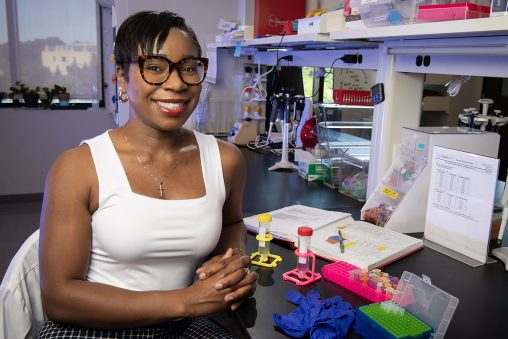
Kelia McMichael, an honors student majoring in physiology and neuroscience at Wright State, has excelled as an undergraduate researcher in the lab of Clintoria Williams, associate professor of neuroscience, cell biology and physiology.
Kelia McMichael, an honors student majoring in physiology and neuroscience at Wright State University, recently received three prestigious awards for research presentations she made at two national meetings. These include the Best Undergraduate Poster Presentation Award at the Conference for Black in Physiology, the Outstanding Undergraduate Abstract Award and the Excellence in Undergraduate Research Award at the American Physiology Summit.
McMichael’s research stems from the work done by Clintoria Williams, Ph.D., associate professor of neuroscience, cell biology and physiology at Wright State, who expressed pride in McMichael’s achievements.
“Winning multiple national awards is a testament to Kelia’s hard work and dedication. Her talent and excellence have truly shined through, and I am very proud of her,” said Williams. “Kelia continues to inspire others both within and outside the lab with her defying achievements. She is definitely headed towards a bright future as a physician-scientist, and I can’t wait to see all the amazing things she will accomplish.”
Williams’ research illuminates the role of the kidneys as the long-term regulator of blood pressure. Specifically, her work unveils a novel connection between zinc deficiency and high blood pressure. Both Williams and McMichael’s research focuses on distinct sodium reabsorption pathways in the kidneys, which are triggered by zinc deficiency.
In the United States, nearly half (48.1%) of the adult population has high blood pressure, or hypertension. Within this population, three out of four do not have their blood pressure under control. Unfortunately, lifestyle changes like exercising, reducing salt intake and medications are simply not enough and, in many cases, diuretics are prescribed.
Diuretics are commonly referred to as water pills and work by taking advantage of the kidneys’ functions in maintaining water homeostasis and salt balance. Even with their wide availability, uncontrolled hypertension continues to be a major unsolved health problem. When high blood pressure is unchecked, it can lead to serious health complications like chronic kidney disease, heart attack, aneurysm, stroke or even death.
“Our lab is looking into ways to mitigate the impact of uncontrolled high blood pressure,” said McMichael. “Not many people are aware, but our kidneys are the long-term regulators of blood pressure.”
Before enrolling in Wright State, McMichael worked as a nurse assistant for six years, working in nursing homes, home health care and family practice. She said she has always been attracted to the healthcare field and wanted to do more to help the patients in her care.
“I really enjoyed taking care of my patients, but my heart was shattered when I was exposed to the reality of what it’s like to live with uncontrolled chronic diseases like kidney failure, hypertension, heart disease and diabetes,” said McMichael. “This ignited a fire in me, and I was inspired to do more for those who suffer daily with chronic diseases.”
Motivated to help others, she enrolled at Wright State in 2020 as a biological science major. After her first year, research piqued her interest.
McMichael said she wanted to make new discoveries that could have a profound impact on patient care. Crediting mentors whom she said nurtured her interests, McMichael was ready to dive into research.
McMichael contacted Meredith Rodgers, a senior lecturer of biological sciences and director of the ASK Program at Wright State, to see if any research opportunities were available. After she was accepted into the ASK program, McMichael began working in Williams’ lab.
At the start of her research experience, McMichael said her knowledge about the kidneys and hypertension was limited. Initially, she was trained in experimental techniques that gave her the opportunity to increase her breadth of knowledge. As she gained more experience, she started working on multiple projects in the lab.
“During that time, Dr. Williams opened my eyes to the fundamental role and importance of the kidneys in keeping us alive,” said McMichael. “Although it has been a challenging experience balancing my time in the lab with classes, it has been a rewarding experience as I learned the necessity of time management. I also learned how to embrace my weaknesses, and this experience has taught me to transform them into strengths.”
Currently enrolled in a combined bachelor’s and master’s degree program, McMichael expects to graduate in the spring of 2024. She credits Williams and Adaku Ume, Ph.D., a medical student at the Wright State Boonshoft School of Medicine, as inspiration in pursuing a dual M.D./Ph.D.
“My end goal is to build a strong bridge of communication between scientists and physicians, to facilitate breakthroughs in research that can directly impact patient care,” said McMichael. “Moreover, I aspire to encourage women and underrepresented populations to participate in clinical research trials. This type of representation is very important because treatments may not work the same for all ethnic backgrounds. Lastly, my aim is to promote and nurture underrepresented youth to pursue a career in STEM.”

 Wright State faculty member Damaris Serrano wins Panamanian literary award
Wright State faculty member Damaris Serrano wins Panamanian literary award  Wright State grad Hannah Beachler earns Oscar nomination for production design on ‘Sinners’
Wright State grad Hannah Beachler earns Oscar nomination for production design on ‘Sinners’  Wright State alum Emily Romigh builds on a family legacy in education
Wright State alum Emily Romigh builds on a family legacy in education  Wright State receives $3 million grant to strengthen civic literacy and engagement across Southwest Ohio
Wright State receives $3 million grant to strengthen civic literacy and engagement across Southwest Ohio  Fitness Center renovation brings new equipment and excitement to Wright State’s Campus Recreation
Fitness Center renovation brings new equipment and excitement to Wright State’s Campus Recreation 